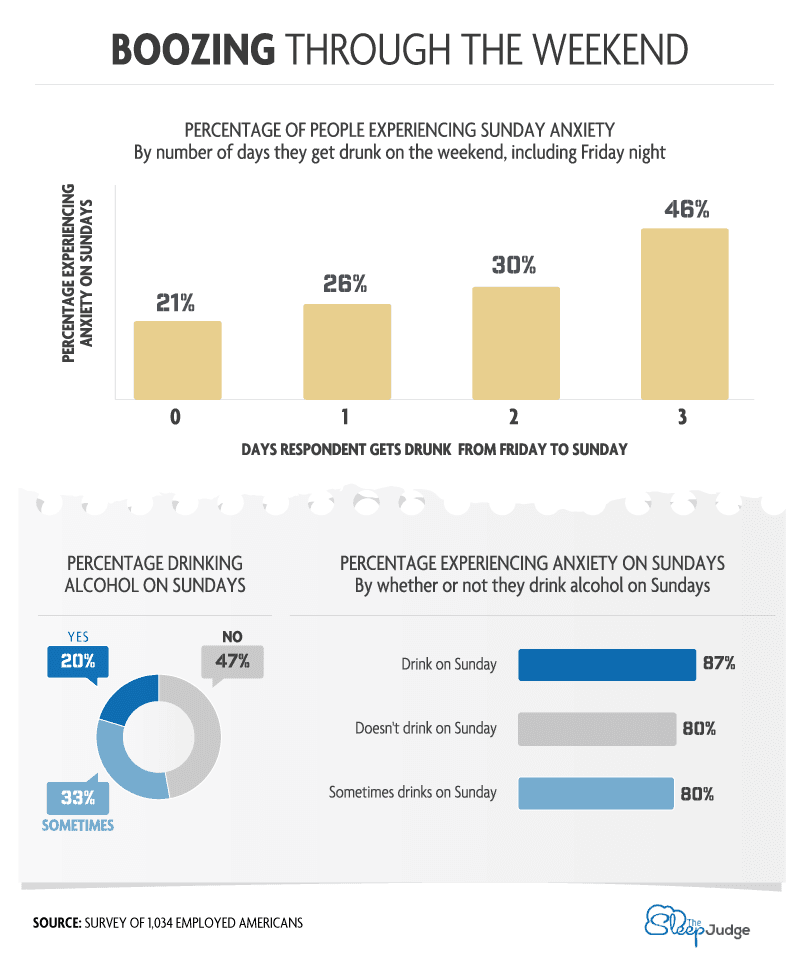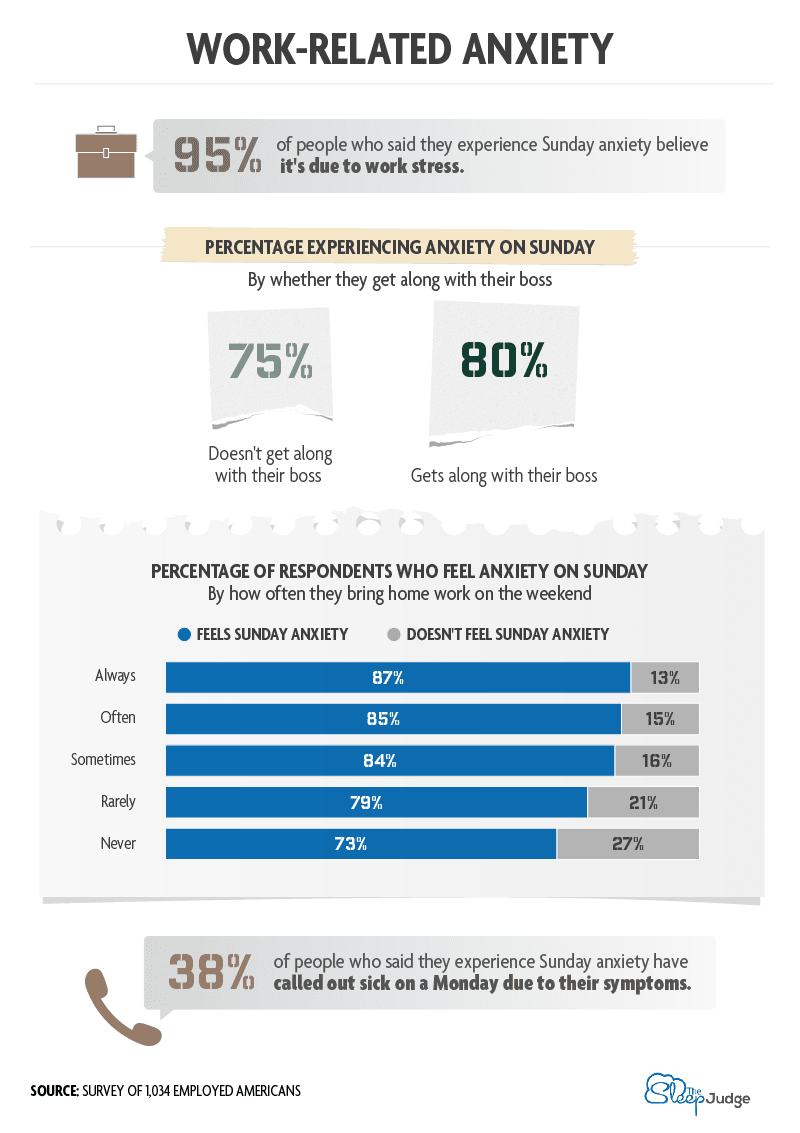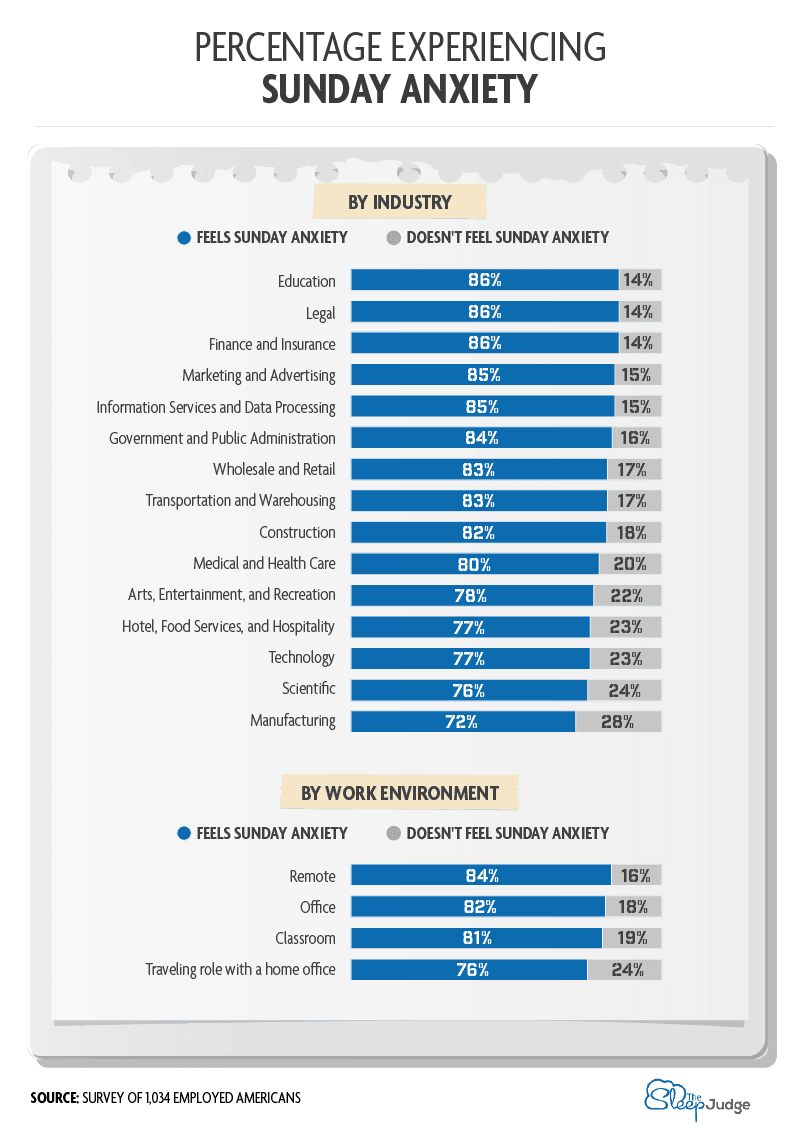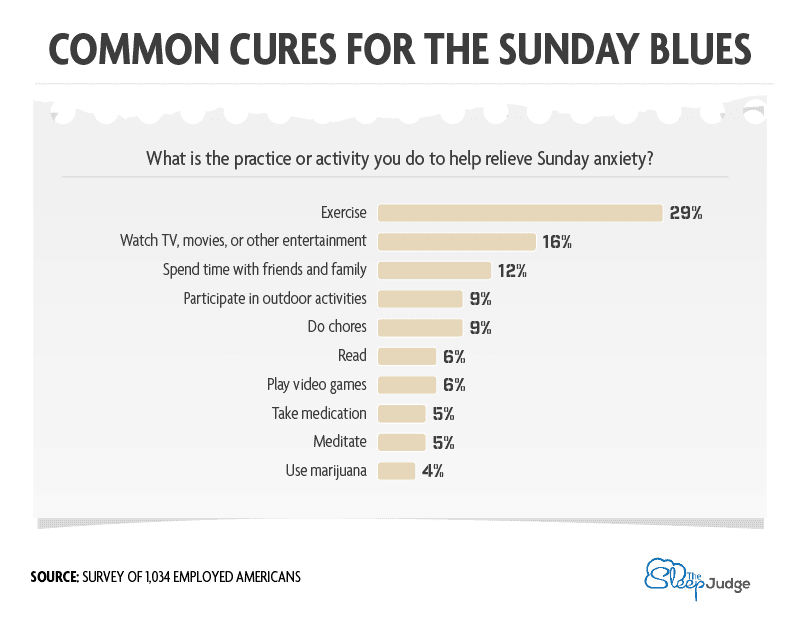If your blissful, brunch-filled Sunday morning turns into a slightly anxious Sunday afternoon and then a full-on, stressed-out Sunday evening, you’re not alone. The “Sunday scaries” are a real phenomenon, and it could be a sign of a much bigger problem.
Feeling depressed at the thought of the week ahead is a form of anticipatory anxiety that affects the body both physically and mentally. More than 3 in 4 Americans report feeling “really bad” anxiety on Sunday night, often triggered by a flood of hormones associated with work-related stress and dread.
For a more in-depth look at the reality of Sunday scaries, we surveyed over 1,000 people about the apprehension they feel as the weekend comes to a close. Read on as we explore how many people feel uneasy about going to work on Monday, what Sunday anxiety symptoms look like, and options for coping with the added stress.
Common Occurrence
There’s something about leaving work on a Friday and feeling relief at not having to get up early the next day – and knowing that, at least for now, your lingering to-do list at work is on pause. Of course, that reprieve won’t last forever, and eventually, you’re going to have to face the real world again.
According to our survey, 81 percent of people said they experience an elevated sense of anxiety on Sunday in anticipation of the week ahead. While some people feel that dread first thing Sunday morning (15 percent) or Sunday afternoon (29 percent), 57 percent of people reported feeling especially stressed out Sunday evening instead.
Sixty-two percent of people polled dreaded Monday most of all and got the worst night of sleep on Sunday (63 percent). As we’ll continue to explore, restless sleep could be a common symptom of job-related anxiety.
Impact of Work-Related Stress
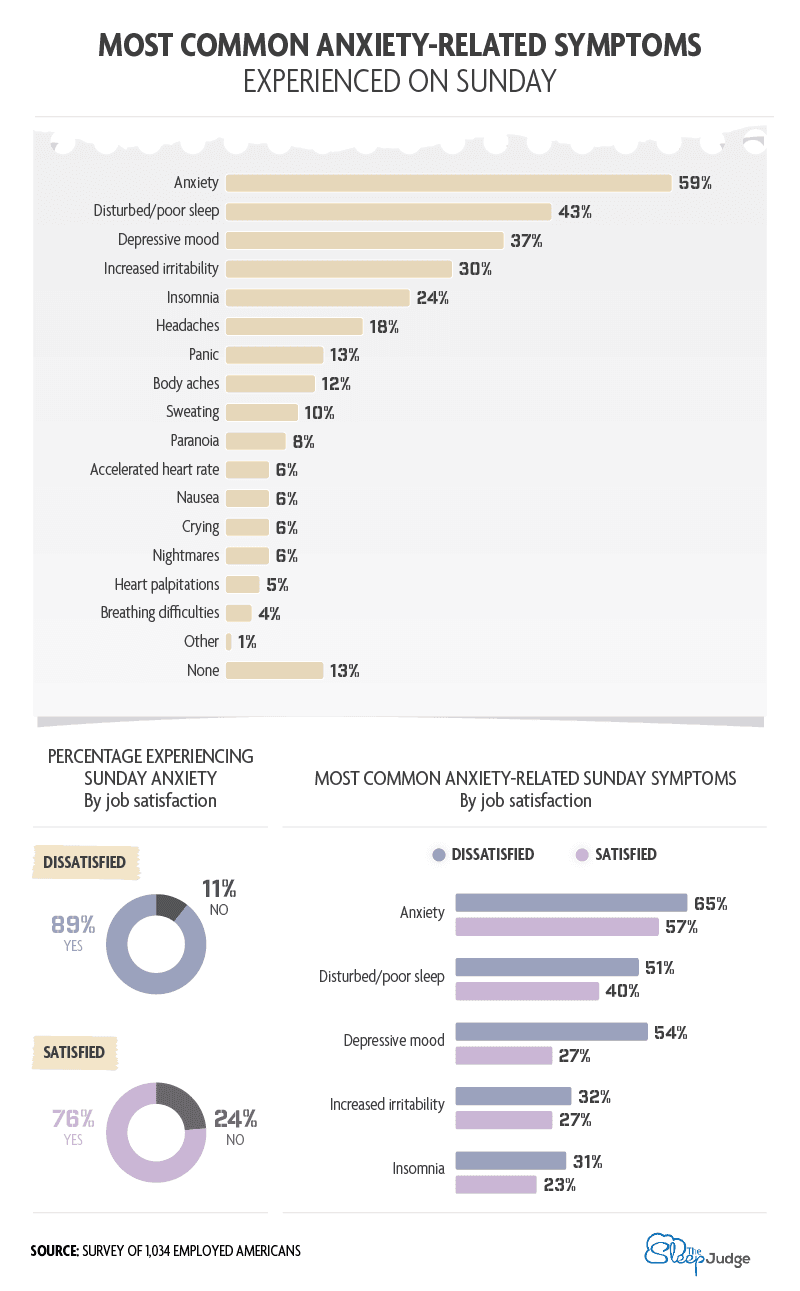
Disturbed or poor sleep (43 percent), depression (37 percent), and increased irritability (30 percent) also ranked among the most common Sunday symptoms experienced. Disturbed or poor sleep (51 percent) and depression (54 percent) were especially common among people who weren’t happy with their job. No matter the industry, sleep plays a vital role in our physical and mental health. Not only do the Sunday scaries make it harder to sleep at night, but also losing out on quality sleep can make your workweek worse.
Harmful Coping Mechanisms
While it may be more appropriate to seek medical attention for constant and long-term anxiety, other solutions like aromatherapy, meditation, vitamin supplements, and journaling can help counter symptoms caused by anxiety. Of course, it’s important to recognize what’s causing your anxiety, especially if it’s work-related.
Unfortunately, some people may attempt to numb their Sunday misery in slightly less healthy ways, and it may not work for them. For those who got drunk Friday through Sunday, 46 percent said they felt heightened anxiety on Sunday. Compare that to those who reported not drinking at all on the weekend: Only 21 percent of that group said they felt anxiety on Sunday.
Alcohol is a common form of self-medication for depression. However, the initial relaxation you may feel won’t work as a long-term solution, as it’s been proven to interrupt sleep and even induce anxious thoughts.
Signaling Stress on the Job
Ninety-five percent of people who said they experience the Sunday scaries believe their heightened anxiety is a result of work-related stress. Among those polled, 80 percent who got along with their boss reported anxiety, which was slightly higher than those who didn’t enjoy spending time with their supervisor (75 percent). A good relationship with your boss can be a positive for your career, but the other side of that growth is more work and greater expectations. It’s understandable, then, that anxiety levels are higher for those with a good relationship with their manager, but professionals may need to learn “no” to keep from burning out.
Experts suggest the most common causes of workplace stress include the fear of being laid off, having to work overtime due to cutbacks, the pressure to perform, and a lack of control over how employees perform their duties. As a result, some people may bring work home over the weekend. But writing a to-do list for Monday may be the extent of work-related activities you should do on the weekend, next to closing your laptop and relaxing.
Anxiety-Inducing Workplaces
Almost everyone finds his or her job stressful from time to time. Whether it’s dealing with co-workers, an inbox you can’t seem to get through, or mounting deadlines, all jobs have their difficulties. Still, some careers may be inherently more difficult than others. Studies suggest dealing with frequent deadlines is among the most stressful job aspects, followed by growth potential and having to interact with the public.
People working in education (86 percent), legal (86 percent), and finance and insurance (86 percent) had the highest likelihood of experiencing Sunday anxiety. While many of these are in-office positions, remote employees don’t always have an easier time managing work-related stress. For many people working from home, the interruptions, isolation, long hours, and an uneven work-life balance can create additional stress. According to our survey, remote employees (84 percent) were the most likely to experience Sunday anxiety compared to those working in an office, classroom, or traveling role.
Finding Stress Relief
With so many people experiencing work-related stress and anxiety on Sunday, we asked them to describe their best coping mechanisms. For 29 percent of people, feeling Sunday anxiety meant finding time to work out. Exercising won’t just help you burn calories – it can also have a positive impact on your mental health. An increase of “feel-good” endorphins (like a runner’s high) makes hitting the gym like meditation in motion. It can improve your mood in the same way that it benefits your physical health.
Watching TV or movies (16 percent), spending time with friends and family (12 percent), and participating in outdoor activities or doing chores (9 percent each) also ranked as popular solutions for managing the Sunday scaries.
Worries in the Workplace
The weekend never seems long enough. As much as we look forward to Friday, we may sacrifice our sanity worrying about the workweek ahead. Based on our survey, a majority of people experienced heightened levels of anxiety on Sunday, and many believed that stress was related to their job.
In addition to feeling anxious, those surveyed acknowledged losing sleep over their Sunday scaries and even experienced depression. While some admitted to coping by consuming alcohol over the weekend, others worked out and spent time with their friends and family – much healthier solutions.
Methodology
We surveyed 1,034 people who are fully employed and start a typical workweek on Monday to measure their levels of anxiety on Sunday. Participants ranged in age from 18 to 70 with an average age of 36 and a standard deviation of 10 years. We had a minimum of 20 respondents per each industry surveyed. We measured anxiety on a scale of 1 to 5, with 1 being “no anxiety felt out of the usual” and 5 being “a lot more anxiety felt out of the usual” to determine whether people had elevated anxiety on Sunday compared to other weekdays.
Fair Use Statement
Aren’t you glad you’re not the only one who feels blue on Sunday? Do your friends a favor by sharing this study with them, but please do so for noncommercial purposes only. Don’t forget to link back to this original study to give us some credit for our Sunday scaries study.
About Us
The Sleep Judge is a Sleep resource website dedicated to raising awareness on sleep issues and providing helpful resources and buying guides. Check out our recently updated Saatva mattress review.


